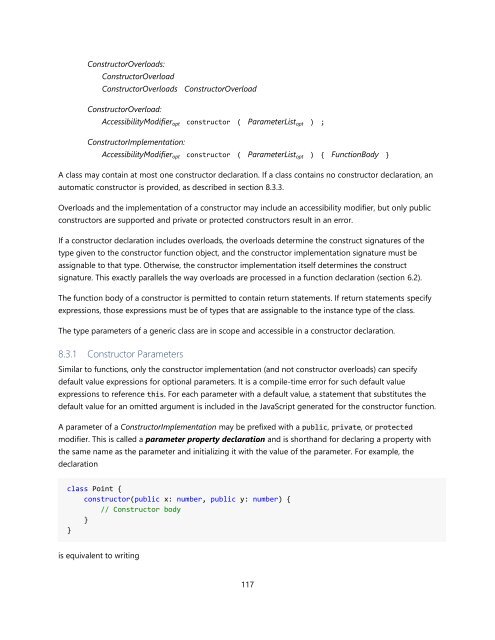TypeScript Language Specification v1.5
TypeScript Language Specification v1.5
TypeScript Language Specification v1.5
Create successful ePaper yourself
Turn your PDF publications into a flip-book with our unique Google optimized e-Paper software.
ConstructorOverloads:<br />
ConstructorOverload<br />
ConstructorOverloads ConstructorOverload<br />
ConstructorOverload:<br />
AccessibilityModifier opt constructor ( ParameterList opt ) ;<br />
ConstructorImplementation:<br />
AccessibilityModifier opt constructor ( ParameterList opt ) { FunctionBody }<br />
A class may contain at most one constructor declaration. If a class contains no constructor declaration, an<br />
automatic constructor is provided, as described in section 8.3.3.<br />
Overloads and the implementation of a constructor may include an accessibility modifier, but only public<br />
constructors are supported and private or protected constructors result in an error.<br />
If a constructor declaration includes overloads, the overloads determine the construct signatures of the<br />
type given to the constructor function object, and the constructor implementation signature must be<br />
assignable to that type. Otherwise, the constructor implementation itself determines the construct<br />
signature. This exactly parallels the way overloads are processed in a function declaration (section 6.2).<br />
The function body of a constructor is permitted to contain return statements. If return statements specify<br />
expressions, those expressions must be of types that are assignable to the instance type of the class.<br />
The type parameters of a generic class are in scope and accessible in a constructor declaration.<br />
8.3.1 Constructor Parameters<br />
Similar to functions, only the constructor implementation (and not constructor overloads) can specify<br />
default value expressions for optional parameters. It is a compile-time error for such default value<br />
expressions to reference this. For each parameter with a default value, a statement that substitutes the<br />
default value for an omitted argument is included in the JavaScript generated for the constructor function.<br />
A parameter of a ConstructorImplementation may be prefixed with a public, private, or protected<br />
modifier. This is called a parameter property declaration and is shorthand for declaring a property with<br />
the same name as the parameter and initializing it with the value of the parameter. For example, the<br />
declaration<br />
class Point {<br />
constructor(public x: number, public y: number) {<br />
// Constructor body<br />
}<br />
}<br />
is equivalent to writing<br />
117


















